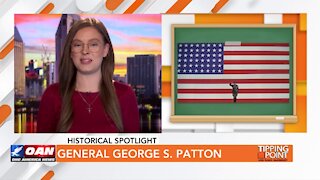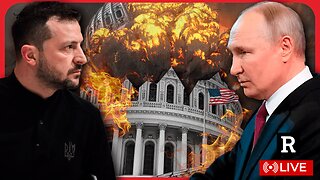Premium Only Content

General George C. Marshall - These are Our Men - Franchot Tone
http://TheseAreOurMen.ChestertonRadio.com
George Catlett Marshall Jr. (December 31, 1880 – October 16, 1959) was an American soldier and statesman. He rose through the United States Army to become Chief of Staff under presidents Franklin D. Roosevelt and Harry S. Truman, then served as Secretary of State and Secretary of Defense under Truman.[3] Winston Churchill lauded Marshall as the "organizer of victory" for his leadership of the Allied victory in World War II, although Marshall declined a final field leadership position that went to his protégé, later U.S. President, Dwight D. Eisenhower. After the war, as Secretary of State, Marshall advocated a significant U.S. economic and political commitment to post-war European recovery, including the Marshall Plan that bore his name. In recognition of this work, he was awarded the Nobel Peace Prize in 1953.
Born in Uniontown, Pennsylvania, Marshall graduated from the Virginia Military Institute (VMI) in 1901. After serving briefly as commandant of students at the Danville Military Academy in Danville, Virginia, Marshall received his commission as a second lieutenant of Infantry in February, 1902. In the years after the Spanish–American War, he served in the United States and overseas in positions of increasing rank and responsibility, including platoon leader and company commander in the Philippines during the Philippine–American War. He was the Honor Graduate of his Infantry-Cavalry School Course in 1907, and graduated first in his 1908 Army Staff College class. In 1916 Marshall was assigned as aide-de-camp to J. Franklin Bell, the commander of the Western Department. After the United States entered World War I, Marshall served with Bell while Bell commanded the Department of the East. He was assigned to the staff of the 1st Division, and assisted with the organization's mobilization and training in the United States, as well as planning of its combat operations in France. Subsequently, assigned to the staff of the American Expeditionary Forces headquarters, he was a key planner of American operations including the Meuse-Argonne Offensive.
After the war, Marshall became an aide-de-camp to John J. Pershing, who was then the Army's Chief of Staff. Marshall later served on the Army staff, commanded the 15th Infantry Regiment in China, and was an instructor at the Army War College. In 1927, he became assistant commandant of the Army's Infantry School, where he modernized command and staff processes, which proved to be of major benefit during World War II. In 1932 and 1933 he commanded the 8th Infantry Regiment and Fort Screven, Georgia. Marshall commanded 5th Brigade, 3rd Infantry Division and Vancouver Barracks from 1936 to 1938, and received promotion to brigadier general. During this command, Marshall was also responsible for 35 Civilian Conservation Corps (CCC) camps in Oregon and southern Washington. In July 1938, Marshall was assigned to the War Plans Division on the War Department staff, and later became the Army's Deputy Chief of Staff. When Chief of Staff Malin Craig retired in 1939, Marshall became acting Chief of Staff, and then Chief of Staff, a position he held until the war's end in 1945.
Originally Broadcast 12/9/1944
-
 18:12:15
18:12:15
Chesterton Radio
1 year ago $3.19 earnedChristmas Radio Live - Holiday Fun All-Day Live Stream
31.8K3 -
 4:40
4:40
One America News Network
3 years agoTipping Point - Historical Spotlight - General George S. Patton
98420 -
 48:44
48:44
Man in America
9 hours agoA MASSIVE Global Financial Reset Is Coming—Are You Ready?
19.2K1 -
 1:15:42
1:15:42
Precision Rifle Network
1 day agoS4E5 Guns & Grub - The Best Rifle Under $2000
20.7K4 -
 1:02:54
1:02:54
Glenn Greenwald
1 day agoSouth Korean Economist Ha-Joon Chang on the Economic World Order, Trump's Tariffs, China & More | SYSTEM UPDATE #410
60.6K43 -
 1:02:27
1:02:27
Donald Trump Jr.
9 hours agoBye Mitch, plus Kash confirmed, Interview with AJ Rice | Triggered Ep.218
113K69 -
 1:12:27
1:12:27
The Amber May Show
11 hours ago $1.72 earnedWomen Of Rumble 02-20-25
24.8K7 -
 41:18
41:18
Kimberly Guilfoyle
9 hours agoToday, We Kash in on Equal Justice, Live with Ryan Walters & Daniel Turner | Ep.198
90.8K21 -
 1:36:50
1:36:50
Redacted News
8 hours agoThe TRUTH in Ukraine has been EXPOSED by Trump and they are melting down | Redacted w Clayton Morris
128K216 -
 2:05:35
2:05:35
The White House
9 hours agoPresident Trump Hosts a Reception Honoring Black History Month
82K45